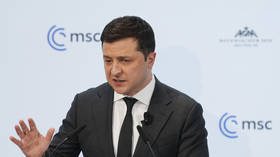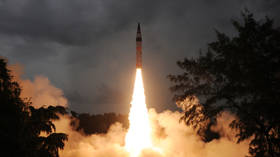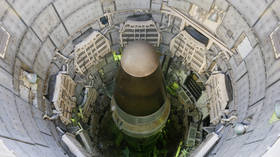Ukraine's nuclear fantasy is dangerous

In his address before the Munich security conference on February 19, 2022, Ukrainian President Volodymyr Zelensky raised the issue of the 1994 Budapest Memorandum ‘On Security Assurances in Connection with Ukraine’s Accession to the Treaty on the Non-Proliferation of Nuclear Weapons’.
“Since 2014,” Zelensky said, “Ukraine has made three attempts to convene consultations with the guarantor states of the Budapest Memorandum. Three attempts failed. Today Ukraine will make the fourth attempt. And I will make my first attempt as the president.”
At this juncture, the Ukrainian president indicated that he was prepared to change the nature of the game. “But both Ukraine and I are doing this for the last time,” he threatened. “I initiate consultations within the framework of the Budapest Memorandum. The minister of foreign affairs was instructed to convene them. If they do not take place again or they do not result in concrete decisions to ensure the security of our state, Ukraine will have every right to believe that the Budapest Memorandum is not working and all the 1994 package decisions have been called into question.”
‘The 1994 package decisions’ Zelensky refers to suggests a link between Ukraine’s decision to join the Nuclear Non-Proliferation Treaty (NPT) as a non-nuclear state, and the security assurances codified in the 1994 Budapest Memorandum, especially that provided by Russia, among other things, “to respect the Independence and Sovereignty and the existing borders of Ukraine.”
The notion that Ukraine’s obligations under the NPT, and Russia’s obligations under the 1994 Budapest Agreement, are a “package decision” is contradicted by Ukraine’s own history regarding nuclear weapons in the post-Soviet context. In its Declaration of Sovereignty on July 16, 1990, Ukraine pledged “not to accept, produce, or acquire nuclear weapons.”
Following the dissolution of the Soviet Union, the Commonwealth of Independent States (CIS) signed the Minsk Agreement on December 30, 1991. It gave the Russian government responsibility for all nuclear weapons, with the caveat that so long as nuclear weapons remained on the soil of the non-nuclear parties (Belarus, Kazakhstan, and Ukraine) those countries would have the right to veto their use.
Ukraine signed the Lisbon Protocol on May 23, 1992, where it agreed to return all nuclear weapons on its soil to Russia. By this time, however, the socio-economic situation inside Ukraine had deteriorated to the point that its elected officials were looking for any potential to monetize Ukraine’s Soviet-era infrastructure. Nuclear weapons were not excluded. Emboldened by arguments put forward by Western academics such as John Mearsheimer, who argued that Ukraine should retain its own independent nuclear deterrent, the Ukrainian parliament balked at handing over its nuclear weapons to Russia, on the belief that a special status for Ukraine as a temporary nuclear state would provide it with greater leverage when it came to being compensated for that which it was being called upon to surrender.
The Ukrainian desire to retain nuclear weapons had nothing to do with security, but rather took the form of nuclear blackmail. In short, it was a grift. And it worked – the United States provided Ukraine with $175 million to dismantle its nuclear weapons, and over $300 million in additional economic aid linked to Ukraine’s commitment to nuclear disarmament. The 1994 Budapest Memorandum must be seen as an extension of this grift.
The reality, however, is that Ukraine was playing poker with chips it didn’t own. While Ukraine assumed administrative control over hundreds of former Soviet nuclear-armed ballistic missiles, full operational control was retained by the Russian Strategic Nuclear Forces. As Vilen Tymoshchuk, a colonel stationed in Ukraine with the 43rd Missile Army, noted: “Neither the president of Ukraine nor anyone in the country could have had any influence on [nuclear] missile launches because the launch codes would have had to go out from the Central Command Post located in Russia.”
This reality escapes those in Ukraine who have embraced the romanticized notion of their country becoming a nuclear power. Shortly after Russia reabsorbed Crimea into its territory in 2014, Ukrainian officials began articulating that Ukraine had a moral and legal right to resume its status as a nuclear weapons state, ignoring the fact that Ukraine never held such a status, either in practice or theory. As recently as last year Ukraine’s ambassador to Germany, Andriy Melnyk, linked Ukraine’s acquisition of nuclear weapons to NATO membership. “How else can we guarantee our defense?” Melnyk said.
Zelensky, Melnyk, and the other nuclear weapons advocates in Ukraine are empowered by two misplaced notions. First, that somehow Ukraine was, at some point in time, entitled to possess nuclear weapons. This was never the case. As Leonid Kravchuk, the Ukrainian leader at the time of the collapse of the Soviet Union, noted, “They [the US] said: Unless you do the job of removing warheads from Ukraine, the consequence will be not just pressure but a blockade of Ukraine. Sanctions and blockade – these were the words they bluntly used.” Volodymyr Lytvyn, the former Ukrainian speaker of Parliament, reinforced this point: “Had Ukraine not given up its nuclear weapons, no one would have recognized it.”
Second, any attempt by Ukraine to acquire nuclear weapons would require it to withdraw from the NPT, an act which would make it a pariah state akin the North Korea. Unlike North Korea, however, Ukraine lacks any nuclear infrastructure capable of producing either a nuclear device or the fissile material required to turn such a device into a deliverable weapon. If Ukraine were to attempt to acquire such capability, it would be subjected to political isolation, economic sanctions, and, ultimately, military destruction.
Zelensky, as well as the rest of Ukraine, knows this all too well. The threats to leave the NPT aren’t real, but rather an extension of the original nuclear grift that began in 1992. This time, Ukraine seeks to use its status as an aggrieved party to try and sweeten the pot. It is encouraged to do so by a host of anti-Russian ‘experts’, who use their access to Western media and politicians to foist the notion that Ukraine is a victim of Russia’s violation of the 1994 Budapest Memorandum. “[W]e are now dealing with something very different,” Anne Applebaum recently wrote in The Atlantic, “people who aren’t interested in treaties and documents, people who only respect hard power. Russia is in violation of the Budapest Memorandum, signed in 1994, guaranteeing Ukrainian security. Do you ever hear Putin talk about that? Of course not.”
“He [Putin] already has violated numerous European treaties and agreements that Moscow signed in the past,” former US Ambassador to Russia Michael McFaul recently testified before the US Congress, “including most germane to this current crisis, the 1994 Budapest Memorandum on Security Assurances for Ukraine. Why should anyone in Kyiv, Brussels, or Washington believe Putin will be more sincere this time around?”
Applebaum and McFaul are part of a host of erstwhile Putin critics disguised as so-called ‘Russian experts’ who seek to obfuscate history in the name of promulgating a misleading and legally flawed narrative regarding the 1994 Budapest Memorandum. Like any argument of note, there are two sides to the story. Applebaum, McFaul, et al, simply want one to believe that the other side of the story simply doesn’t exist. But it does.
As explained by Russian deputy foreign minister, Sergei Ryabkov, in December of last year, Russia believes that it has fulfilled its obligations under the 1994 Budapest Memorandum. “The Budapest Memorandum,” Ryabkov said, “concerns security guarantees for Ukraine as a non-nuclear state within the meaning of the NPT (Non-Proliferation Treaty). And from this point of view, all guarantees have been provided and observed.”
However, as the famous American radio broadcaster, Paul Harvey, famously observed, there was “the rest of the story.” As Ryabkov noted, “But the Budapest Memorandum does not make the slightest mention of the coups in Ukraine or subsequent actions, or the possibility that some of the population, which lived within the borders of Ukraine at the time, should decide whether they should continue living there or return to the Russian Federation.”
Here we see an interesting juxtaposition of two fundamental principles of international law. Regrading its decision to join the NPT, Ukraine is bound by the principle of pacta sunt servanda – agreements must be kept. Ukraine made the decision to join the NPT prior to, and independent of, the 1994 Budapest Memorandum. Nothing about its allegations of Russian non-compliance to that agreement could legitimize a decision to withdraw from such a foundational treaty obligation, and to do so would certify Ukraine as a pariah state, regardless of the nonsense peddled by Russophobes like Anne Applebaum and Michael McFaul.
Russia, on the other hand, has made a case for clausula rebus sic stantibus, the legal doctrine allowing for a contract or a treaty to become inapplicable because of a fundamental change of circumstances. From Russia’s perspective, the Maidan Revolution of February 2014 constitutes such a fundamental change in circumstances, with the government that emerged in Ukraine following what Russia has called a US-backed coup possessing a fundamentally different character from that which it replaced so as to make any agreement null and void. Russia’s argument is furthered by the fact that the 1994 Budapest Memorandum is not a treaty, but rather an agreement, as opposed to, for instance, the NPT, which Ukraine is bound to by a treaty obligation completely separated structurally and legally from the 1994 Budapest Memorandum.
Zelensky can cry until he is blue in the face about what he believes is Russia’s perfidy when it comes to Crimea and the 1994 Budapest Memorandum. The undisputable reality, however, is that the Ukrainian president is wrong, both factually and legally, on this issue, and any effort on the part of Ukraine to compound this error of historical misrepresentation by acting in a manner which obviated its treaty obligations under the NPT would be tantamount to taking a suicide pill.
The statements, views and opinions expressed in this column are solely those of the author and do not necessarily represent those of RT.

















